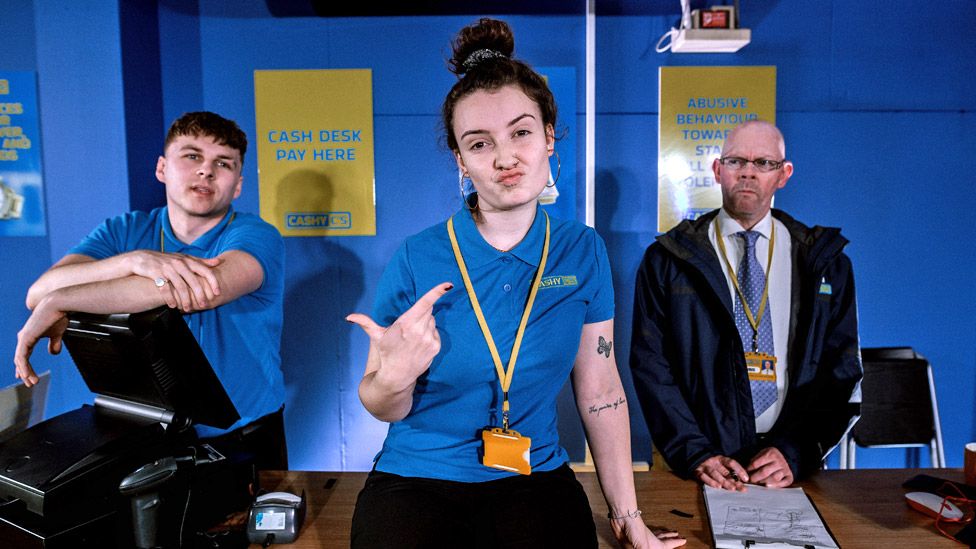ARTICLE AD BOX
By Ian Youngs
Entertainment & arts reporter
 Image source, Karol Wyszynski
Image source, Karol Wyszynski
Charles Humphreys, Phoebe Smith and Rob Took play Cashy C's staff members
Most plays start when the curtain goes up in a theatre. But Cashy C's: The Musical begins when the metal security shutter rises on the front of a pawnbrokers shop.
Once the blue shutter has cranked up, an actor leads the audience inside, where they find their seats surrounded by shelves holding old TVs, toasters, turntables, tool kits, fans, guitars, lamps, a battered printer and a kettle.
We meet a staff member who must deal with customers in varying degrees of desperation and dodginess, and who is powerless to avoid being pulled into a precarious situation himself.
Between the play's scenes, a rapper emerges from a DJ booth to deliver his musical commentary on the drama unfolding on the shop floor.
Outside, real shoppers walk past the shop window as they go about their business in Bradford city centre, oblivious to the fact they are what the show's producer Rosie Freeman jokingly describes as "our amazing extras".
The cast and crew are prepared for some to accidentally wander in during performances, as they have done during rehearsals, not realising it's not currently a real shop.
"They could steal the show at times, I think," laughs writer and director Kirsty Taylor.
Image source, Karol Wyszynski
Image caption,A succession of regular customers come through the doors, with rapper Ty Richards (centre) the narrator
This used to be a frozen food shop, but was empty and has now been kitted out as a pawnbrokers to provide the setting for Cashy C's: The Musical. The name is a thinly veiled reference to a particular pawn shop chain.
"The idea came from being in a Cash Converters, a specific one in Bradford, a big one," Taylor explains.
"The staff were really engaging. Some people were just bringing in Xbox games because teenagers wanted a bit of money.
"And then when I looked into the back, there were people's kettles and things that people were temporarily selling - things that were important to them, or actually just household objects, or their kids' Christmas presents that they've had to resell, that they're then going to buy back for more money.
"That made me just start to think what a setting it could be."
Every kitchen essential or children's toy could tell a story about why someone needed to trade it in before buying it back later - with interest.
That makes a pawn shop a rich setting for bringing together underlying themes about poverty, debt, crime, health inequality and addiction, Taylor says. "The list of things which other people, if you're not maybe from this background and don't live within these areas, have no idea about."
Image source, Karol Wyszynski
Image caption,Writer and director Kirsty Taylor has wrestled with whether the show is perpetuating working-class stereotypes
Taylor has been working on the show for several years, but it has become more topical as the cost of living crisis has begun to bite.
"As the play developed, the situation for the context for the play got much worse," she says.
"I actually couldn't have imagined that it would get any worse. And it got worse and worse, and here we are, like in the peak of… I don't know if it's the peak because it's probably going to go on for however long."
For research, Taylor spoke to real pawn shop staff, who told her those using their services are not just the "stereotypical characters that you might expect to see in the play".
"The people who are actually using these services are everyday people," she says.
"One kept saying about this train driver. It's people who've got various different kinds of jobs. It's not just unemployed people. It's not just people with five kids. Not that it should not be OK for them."
Despite its themes, the writer doesn't want her show to just be poverty pawn porn.
She is fiercely proud of her home city, and made her name writing and performing poems that are love letters to Bradford, warts and all.
Warning: Third party content may contain adverts
"As well as the bleak themes, it is a celebration of Bradford and working class culture and character and wit and humour, and how we speak to each other," Taylor says of her play. "And music as well. Music is such a big part of it."
Bradford has a booming rap and bassline scene, and the show's music has been written by Taylor and Jae Depz, with rapper Ty Richards starring as the narrator.
Rather than make a traditional trailer, Richards fronted a music video to promote the show, and he thinks that - and the fact it is being staged in a shop - helped it appeal to people who wouldn't normally go to a theatre. Tickets for the Bradford shows sold out in less than 24 hours.
The rapper says the story resonates with him. "I think [it is successfully] getting the people I grew up around, growing up on an estate, being around the themes of poverty, crime, drug use.
"But it's also the unique characters, the community aspect of it, the warmness, the fact that everyone knows each other, the gossip that goes round, the role models, the people that you look up to that can help you out of situations.
"There's that balance of the negative aspects that you want to shine a light on, but then there's the positives of growing up in working-class communities. It's exactly how I grew up."
Image source, Karol Wyszynski
Image caption,The lively Callum finds himself in a difficult position when trouble arrives at the shop
Taylor admits she wrestled with whether the show is perpetuating working-class stereotypes.
"When I chat to people and we're living this life, and we are here, I really wanted the play to be honest," she says.
"I didn't want it to glamorise working class lifestyle or crime, but be really honest about some of it. So the characters aren't perfect. Because we aren't, are we?"
Bradford - and Taylor - are likely to get more of the spotlight when it is the next UK City of Culture in 2025. That title is "just about opportunity", the writer says.
"It's about Bradford being on the news and in the media for something positive, and for people to get an opportunity to try stuff out, to see what they like, to find out what they're good at, to have an opportunity for things to be going on in this city."
With Cashy C's, the writer joins the ranks of Bradford dramatists who have given an affectionate but unvarnished view of their city, following Rita, Sue and Bob Too playwright Andrea Dunbar and film-maker Clio Barnard, whose latest release Ali and Ava was nominated for best British film at this year's Baftas.
"I've just always had a fascination for Bradford people and stories," Taylor adds. As she speaks, people drop off more second-hand goods to fill the shelves for the show.
"There are stories behind all the characters that could all probably relate to real people I know or I've met or my family.
"I work a lot in school settings and community settings, and this shop is the window to Bradford.
"We're meeting these characters and people all the time. It is a reality for us. And I was just interested in how to tell some of those stories."
Cashy C's: The Musical is in Bradford until 7 October, and in Keighley from October.

 2 years ago
113
2 years ago
113








 English (US) ·
English (US) ·